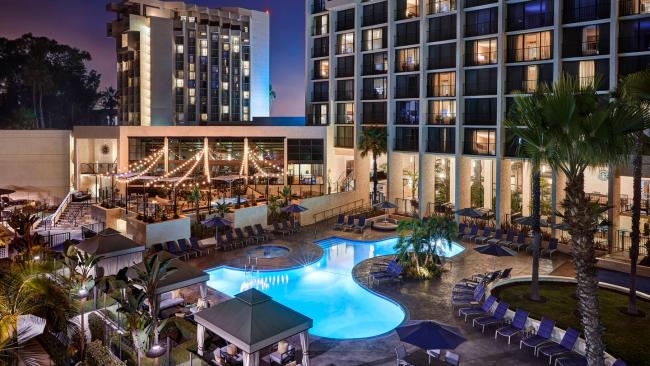29th International Symposium on Autonomic Nervous System (AAS) 18191
The purpose of this activity is so that providers can communicate published guidelines on the evaluation and treatment of clinical autonomic disorders, as well as state of the art clinical and basic science on autonomic physiology and clinical autonomic disorders. Clinical autonomic disorders are a poorly understood, but increasingly recognized set of disorders. This meeting will serve to update the “experts” on the latest advances in the field.
Generalist Workshop and UCNS Review Course
Newport Beach Marriott Hotel & Spa, California
Wednesday, October 24
8:00 AM – 5:00 PM
Autonomic Medicine: A Course for Generalists Through Specialists
Organizer: David S. Goldstein, MD PhD
Workshop description: This workshop introduces autonomic medicine for generalists using a concept-based didactic approach and provides more directed coverage of autonomic disease entities, tests, and treatments for clinicians planning to take the UCNS certifying examination in autonomic disorders (https://www.ucns.org/go/subspecialty/autonomic). Faculty at the workshop are leading clinical academicians with extensive experience and expertise in this growing discipline. The course follows the general organization of Dr. Goldstein’s Principles of Autonomic Medicine, which is a freely available resource for trainees, patients, and clinicians.
Real-time conference calls: The workshop at the American Autonomic Society annual meeting culminates a series of real-time conference calls led by Dr. Goldstein for meeting registrants. Conference calls are optional for workshop participants but are highly recommended for clinicians planning to take the UCNS certifying examination. Calls are planned for Sundays at 2 PM EST on the following dates:
August 19 and 26
September 9, 16, 21, and 30
October 7, 14, and 21
To participate in the workshop and real-time conference calls:
- Register for the AAS Annual Meeting to be held October 24-27, 2018 at Newport Beach Marriott Hotel & Spa, California: https://americanautonomicsociety.org/register-for-the-29th-annual-aas-conference/
- Meeting registrants will receive an email with a link to attend each conference call (held via Zoom meeting)
Topics to be covered:
Generalists & Specialists
What are dysautonomias?
Why are dysautonomias so hard?
What is the autonomic nervous system?
Organization of the ANS
The central autonomic network
How does the ANS work?
Chemical messengers of the ANS
In dysautonomias what goes wrong?
The Dysautonomias Universe
Dysautonomias across the life span
How are dysautonomis classified?
Conditions associated with autonomic failure
Conditions associated with autonomic stimulation
What are the symptoms and signs of dysautonomias?
What is orthostatic hypotension?
What is orthostatic intolerance?
Autonomic function tests
What is the most important autonomic function test?
Overview of physiological, pharmacologic, biochemical, neuroimaging, and genetic tests
Managing dysautonomias
The most effective treatment
Non-drug treatments
Drug treatments
Living with dysautonomias
The Big Picture
How does homeostasis happen?
Flipping the clinic
Specialists, UCNS Certifying Exam. Prep
Stars in the Dysautonomias Universe
Inherited or congenitals dysautonomias
Diabetes
Hypertension
Heart failure
Stress cardiopathy
Chronic orthostatic intolerance
Autonomically mediated syncope
Postural tachycardia syndrome
Baroreflex failure
Spinal cord injury
Stroke
Chronic autonomic failure
Multiple system atrophy
Pure autonomic failure
Parkinson’s disease with orthostatic hypotension
Dementia with Lewy bodies
Autoimmunity-associated dysautonomias
Autonomic function tests: detailed consideration
Physiological
Pharmacologic
Biochemical
Neuroimaging (macroscopic & microscopic)
Genetic
Managing dysautonomias: detailed consideration
Non-drug treatments
Drug treatments
Target Audience
Physicians treating patients with autonomic disorders
Learning Objectives
At the conclusion of this activity, I will be able to:
1. Enumerate the criteria for diagnosing neurogenic orthostatic hypotension
2. List the criteria for postural tachycardia syndrome
3. Outline a management strategy for patients with postural tachycardia syndrome
AGENDA
Wednesday, October 24, 2018
8:00AM - 5:00PM Generalist Workshop and UCNS Review Course
5:00PM - 6:30PM Registration
6:30PM - 9:00PM Poster Session I and Trainee Poster Compeition (Cheese & Wine)
Thursday, October 25, 2018
7:00AM - 8:20AM Continential Breakfast
8:20AM - 8:30AM Welcome Remarks
8:30AM - 9:15AM Robert Plenary Lecture
9:15AM - 5:30PM Session 1: Autonomic Ardiovascular Regulation
6:00AM - 8:45PM Session 2: Autonomic Neuropathy and POTS
Friday, October 26, 2018
7:00AM - 8:30AM Continental Breakfast
8:30AM - 11:00AM Session 3: Orthostatic Hypotension, Supine Hypertension, and Syncope
11:00AM - 10:00PM Session 4: Multiple System Atrophy
Saturday, October, 27, 2018
7:00AM - 8:30AM Continental Breakfast
8:30AM - 9:15 AM Cognitive Dysfunction in Autonomic Disorders Plenary Lecture
8:30AM - 12:45 PM Session 5: Autonomic Disorders and Co-Morbid Conditions

Newport Beach Marriott Hotel and Spa
Newport Beach, California
In accordance with the ACCME® standard for Commercial Support Number 6, all in control of content disclosed any relevant financial relationships. The following in control of content had no relevant financial relationships to disclose. Additional disclosure informtion provided on-site before the meeting.
Activity Director Y Chiar of Meeting Committee: Cyndya Shibao, MD
Accreditation Statement:
This activity has been planned and implemented in accordance with the accreditation requirements and policies of the Accreditation Council for Continuing Medical Education through the joint providership of The Medical College of Wisconsin and American Autonomic Society. The Medical College of Wisconsin is accredited by the ACCME to provide continuing medical education for physicians.
AMA Credit Designation Statement:
The Medical College of Wisconsin designates this live activity for a maximum of 24.5 AMA PRA Category 1 Credit(s)TM. Physicians should claim only the credit commensurate with the extent of their participation in the activity.
The Medical College of Wisconsin designates this activity for up to 24.5 hours of participation for continuing education for allied health professionals.
Available Credit
- 24.50 AMA PRA Category 1 Credit(s)™AMA PRA Category 1 Credit(s)™
- 24.50 Hours of ParticipationHours of Participation credit.

 Facebook
Facebook X
X LinkedIn
LinkedIn Forward
Forward